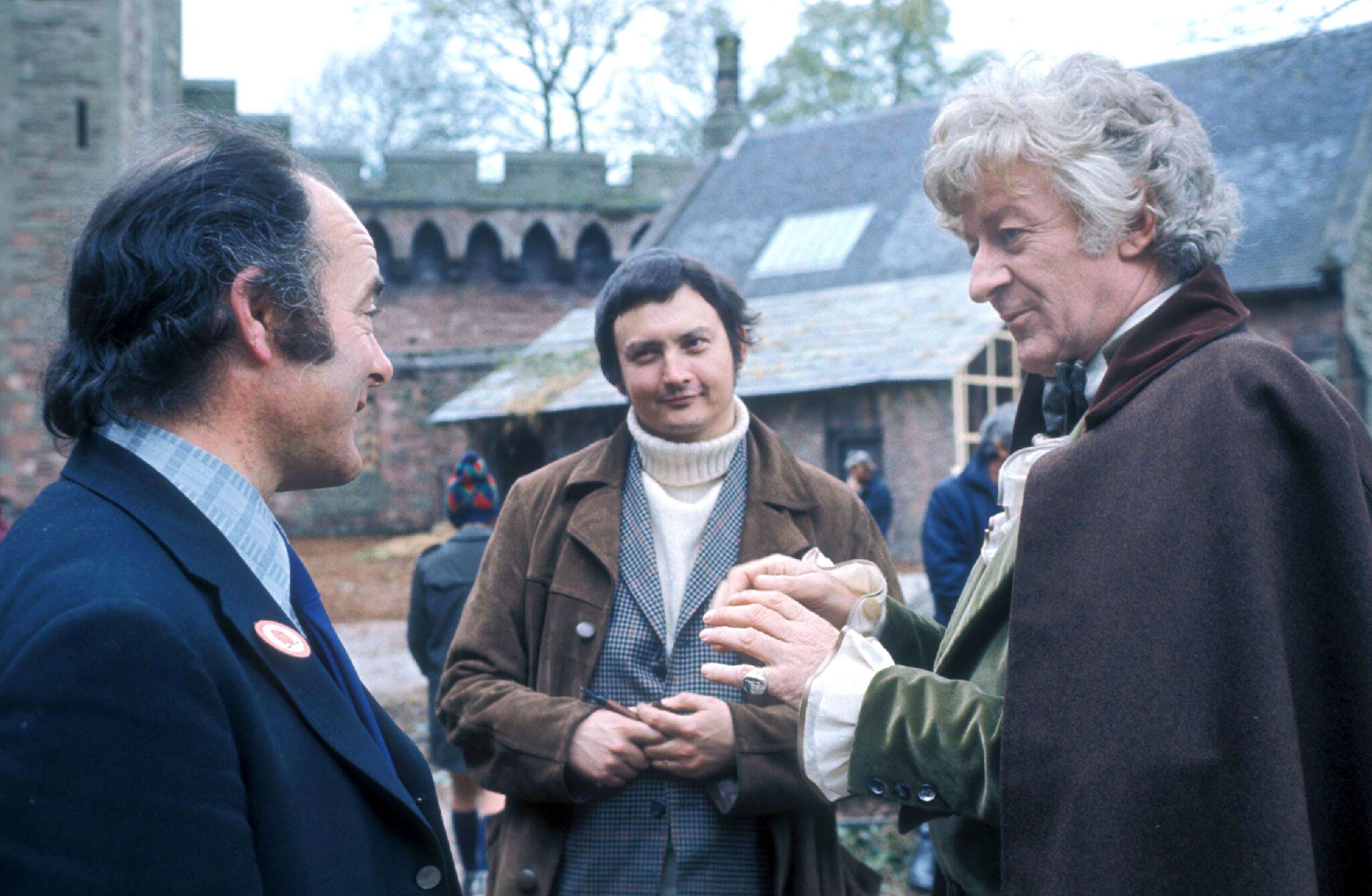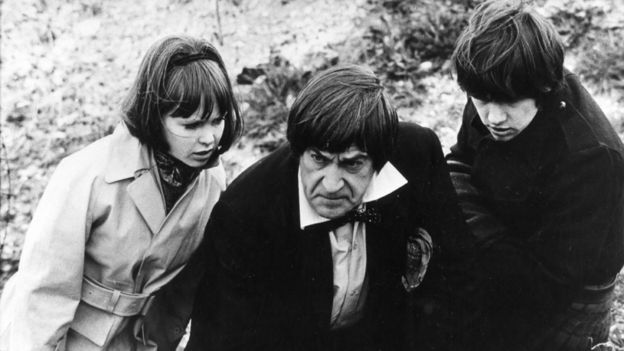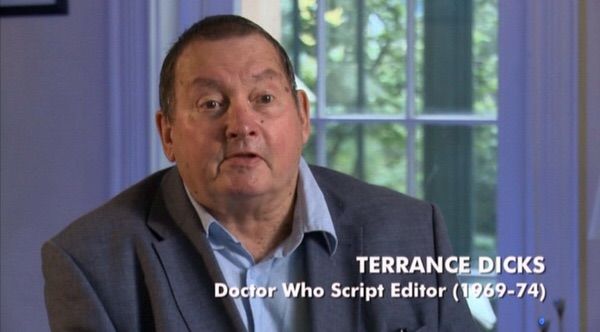Terrence Dicks: 1935-2019

The Gallifreyan Newsroom is sad to learn the death of Doctor Who writer, novelist and script editor Terrence Dicks at the age of 84.
Dicks worked as script editor on more than 150 episodes of the classic sci-fi show. He also wrote numerous episodes.
Yet he is arguably better known for the many Doctor Who novelisations he wrote for the Target Books imprint.
Author Jenny Colgan said..
he had “helped more children (especially boys) develop a lifelong love of reading than almost anyone else who’s ever lived”.
Terrance Dicks helped more children (especially boys) develop a lifelong love of reading than almost anyone else who's ever lived. I don't think he even got an OBE.
— Jenny Colgan is on Threads as @jennycolganbooks (@jennycolgan) September 2, 2019
Actress Katy Manning who played The Doctor’s companion Jo Grant in the 1970’s said…
my friend
one of the best most knowledgable funny DW family has gone on his awfully big adventure
#TerrenceDicks lived life to the max.did my first usa cons 15 cities in 17 days of joy what a wonderful legacy of books he has left.a hugeDW footprint
pic.twitter.com/2tgDqEEZaq
— KatyManning Official welcomes you (@ManningOfficial) September 2, 2019
Writer and Doctor Who fan, Matthew Sweet:
How many of us here have a bookshelf like this? Thousands I bet. Terrance Dicks was taught by FR Leavis. These little paperbacks are in my canon. They’ve been with me for decades. I expect to see them when I’m wheezing and groaning on my deathbed. pic.twitter.com/ixesSfnall
— Matthew Sweet (@DrMatthewSweet) September 2, 2019
The BBC reported on Terrence’s death via the official twitter feed…
We are sad to report the death of Terrance Dicks, one of the original writers of Doctor Who. https://t.co/E6LCaWtB8x
— Doctor Who (@bbcdoctorwho) September 2, 2019
Doctor Who Magazine said…
Very sad news – Terrance Dicks has died. https://t.co/pEbjS7V8uo
— Doctor Who Magazine (@DWMtweets) September 2, 2019
Writer Benjamin Cook paid this tribute…
This, from Steven Moffat (over on Instagram), is spot on. "He was, I think, the writer who sorted out how the Doctor thinks. He thinks, as it turns out, exactly the way Terrance wrote."#UncleTerrance #TerranceDicks #DoctorWho pic.twitter.com/0TozEDmzmR
— Benjamin Cook (@benjamin_cook) September 2, 2019
Sci-fi writer Neil Gaiman also paid tribute, saying he would have never written for Doctor Who had Dicks not shown him how to do it.
I remember reading his and Malcolm Hulke's book THE MAKING OF DOCTOR WHO when I was eleven or twelve, and deciding then that I would one day write an episode of Doctor Who, because they had shown me how. RIP Terrance Dicks. https://t.co/LXKsfSJz81
— Neil Gaiman (@neilhimself) September 2, 2019
Mark Gatiss, another member of the Doctor Who writing family, remembered Dicks as…
“a brilliant TV professional [and] a funny and generous soul”.
Very hard to express what Terrance Dicks meant to a whole generation. A brilliant TV professional, a funny and generous soul. Most of all, though, an inspirational writer who took so many of us on unforgettable journeys into space and time. Bless you, Terrance.
— Mark Gatiss
(@Markgatiss) September 2, 2019
He was also, Gatiss continued,
“an inspirational writer who took so many of us on unforgettable journeys into space and time”. Chris Chibnall, Doctor Who’s current show runner, said Dicks had been “responsible for some of the show’s greatest moments and iconic creations”.The lights of Doctor Who are dimmer tonight,” he said in a statement. “He was one of the greatest contributors to Doctor Who’s history, on screen and off.” “Everyone working on Doctor Who sends his family and friends our love and condolences at this difficult time.”
Born in east London in 1935, Dicks joined Doctor Who towards the end of Patrick Troughton’s tenure as the programme’s second Doctor.One of his best-loved episodes was 1983’s “The Five Doctors”, the BBC show’s 20th anniversary special.
Dicks also worked on such shows as The Avengers, The Diary of Anne Frank and a 1983 version of Jane Eyre starring Timothy Dalton.
More than just another Doctor Who writer’
by Lizo Mzimba, entertainment correspondent
https://twitter.com/lizo_mzimba/status/1168519150513377287
https://twitter.com/lizo_mzimba/status/1168554326823985152
Terrance Dicks was more than just another Doctor Who Writer. His stories were some of the most influential of the original classic series.
His first credited script for the show was 1969’s The War Games with Patrick Troughton. Producer Derrick Sherwin had suggested the concept that the Doctor came from a race called the Time Lords.

The War Games script from Dicks and co-writer Malcolm Hulke took that idea and successfully introduced audiences to one of the series’ most popular and longest-running elements.
As script editor, Dicks – together with producer Barry Letts – was one of the creators of the Doctor’s arch-enemy The Master, introduced in the Jon Pertwee story “Terror of the Autons”.
Just as importantly, the huge number of Doctor Who novelisations he wrote were instrumental in awakening a love of reading and an enduring passion for books in a generation of children.
Terrence Dicks: Selective Doctor Who Television Credits
The Seeds of Death (1968)
The Invasion (1968)
The War Games (1969)
The Brain of Morbius. (As Robin Bland) (1976)
Horror of Fang Rock (1977)
State of Decay (1980)
The Five Doctors. (1983)
Terrence Dicks: Authorship of Doctor Who Novelisations

Most of Dicks’ Doctor Who novelisations incorporated the prefix “Doctor Who and…” before the title, as did most of the series’ novelisations prior to 1981. Several of his novels were subsequently re-printed in omnibus editions, such as The Adventures of Doctor Who and The Dalek Omnibus. In the late 1980s, Star Books issued “2-in-1” collections of selected Target Books novelisations, which included several of Dicks’ works.
- The Auton Invasion (1974)
- The Day of the Daleks (1974)
- Terror of the Autons (1975)
- The Planet of the Spiders (1975)
- The Three Doctors (1975)
- The Planet of the Daleks (1976)
- The Carnival of Monsters (1977)
- The Claws of Axos (1977)
- The Mutants (1977)
- The Time Warrior (1978; with Robert Holmes, who is uncredited)
- Death to the Daleks (1978)
- The Monster of Peladon (1980)
- Inferno (1984)
- The Mind of Evil (1985)
- The Time Monster (1985)
- Ambassadors of Death (1987)
- The Abominable Snowmen (1974)
- The Web of Fear (1976)[12]
- The Krotons (1985)
- The Faceless Ones (1986)
- The Seeds of Death (1986)
- The Wheel in Space (1988)
- The Space Pirates (1990)
- The Giant Robot (1975; re-titled Robot for the 1992 edition; Dicks also wrote a version for younger readers, Junior Doctor Who and the Giant Robot, which was published in 1980)
- The Loch Ness Monster (1976; re-titled Terror of the Zygons for the 1993 edition)
- The Pyramids of Mars (1976)
- The Revenge of the Cybermen (1976)
- The Genesis of the Daleks (1976)[12]
- The Face of Evil (1977)
- The Brain of Morbius (1977; Dicks also wrote a version for younger readers, Junior Doctor Who and the Brain of Morbius, which was published in 1980)
- The Planet of Evil (1977)
- The Deadly Assassin (1977)
- The Talons of Weng-Chiang (1977)
- The Horror of Fang Rock (1978)
- The Android Invasion (1978)
- The Hand of Fear (1979)
- The Invisible Enemy (1979)
- The Robots of Death (1979)
- The Image of the Fendahl (1979)
- The Destiny of the Daleks (1979)
- Underworld (1980)
- The Invasion of Time (1980)
- The Stones of Blood (1980)
- The Androids of Tara (1980)
- The Power of Kroll (1980)
- The Armageddon Factor (1980
- The Nightmare of Eden (1980)
- The Horns of Nimon (1980)
- The State of Decay (1981)
- The Keeper of Traken (1982)
- The Sun Makers (1982)
- Meglos (1983)
- The Dalek Invasion of Earth (1977)
- An Unearthly Child (1981)
- The Smugglers (1988)
- Planet of Giants (1990)
- Four to Doomsday (1983)
- Arc of Infinity (1983)
- The Five Doctors (1983)
- Kinda (1983)
- Snakedance (1984)
- Warriors of the Deep (1984)
- The Caves of Androzani (1984)
- The Trial of a Time Lord: The Mysterious Planet (1987)
- Sarah Jane Adventures – Invasion of the Bane (2007)[13]
Original novels

- Virgin New Adventures (the Doctor):
- Timewyrm: Exodus (1991)
- Blood Harvest (1994)
- Shakedown (1995)
- Virgin New Adventures (Bernice Summerfield):
- Mean Streets (1997)
- Eighth Doctor Adventures:
- The Eight Doctors (1997)
- Endgame (2000)
- Past Doctor Adventures:
- Catastrophea (1998)
- Players (1999)
- Warmonger (2002)
- Deadly Reunion (2003) (with Barry Letts)
- World Game (2005)
- New Series Adventures (Quick Reads):
- Made of Steel (2007)
- Revenge of the Judoon (2008)
Terrance Dicks: Obituary

Terrance Dicks (10 May 1935 – 29 August 2019) was an English author and former television screenwriter, script editor and producer.
In television, Dicks had a long association with the BBC science-fiction series Doctor Who, working as a writer and also serving as the programme’s script editor from 1968 to 1974. The Doctor Who News Page described him as…
“arguably the most prolific contributor to Doctor Who“.
He later became a script editor and producer of classic serials for the BBC.
Dicks wrote many popular children’s books during the 1970s and 1980s. He also maintained his association with Doctor Who by adapting televised stories into novelisations for Target Books.
Born in East Ham, Essex (now part of Greater London), the only son of his parents William and Nellie (née Ambler). Dicks studied English at Downing College, Cambridge, and later performed two years of National Service in the British Army. Following his discharge from the armed forces, he worked for five years as an advertising copywriter, and started to write radio play scripts for the BBC in his spare time.
His break-through into television came when friend Malcolm Hulke asked for his help with the scripting of “The Mauritius Penny”, an episode of the second series of ABC action-adventure The Avengers, for which Dicks was awarded a co-writer’s credit. Dicks went on to co-write a further two Avengers episodes with Hulke: the second, “Intercrime”, was later re-worked for the sixth and final series.
In 1968, Dicks was hired as assistant script editor on the popular BBC science-fiction TV series Doctor Who. He was appointed head script editor the following year, and earned his first writing credit for the programme when he and Hulke co-wrote the 10-part serial The War Games, which concluded the series’ sixth season and the Second Doctor’s (Patrick Troughton) tenure. Dicks had, however, been the uncredited co-writer of the earlier serial The Seeds of Death, having extensively re-written Brian Hayles’ original scripts.
Dicks went on to form a highly productive working relationship with incoming Doctor Who producer Barry Letts, serving as script editor on all of Letts’ five seasons as head of the programme from 1970 to 1974. In 1972, Dicks embarked on a parallel career as an author with the publication of his first book, The Making of Doctor Who (a history of the production of the TV series), which was co-written by Hulke.
After stepping down as script editor, Dicks continued his association with Doctor Who, writing four scripts for his successor, Robert Holmes: these were Robot (1975, Tom Baker’s first outing as the Fourth Doctor), The Brain of Morbius (1976, for which Dicks was credited under the pseudonym “Robin Bland” after his displeasure at Holmes’ re-writes prompted him to request that it be shown “under some bland pseudonym”), Horror of Fang Rock (1977) and State of Decay (1980).
State of Decay was in fact a re-written version of a story originally titled The Vampire Mutations, which had been due for production during season 15 until the BBC decided that the vampiric theme would clash with the plot of its new adaptation of Bram Stoker’s Count Dracula, which was due for transmission at roughly the same time, and replaced it with Horror of Fang Rock. Dicks penned his final Doctor Who script in 1983, when he wrote the programme’s 20th anniversary special episode, The Five Doctors.
Dicks’ other work for Doctor Who includes two stage plays, Doctor Who and the Daleks in the Seven Keys to Doomsday (1974) and Doctor Who – The Ultimate Adventure (1989), and an audio drama for Big Finish Productions titled Comeback (2002), which was the first to feature former Doctor’s companion Sarah Jane Smith in a significant capacity.
Dicks contributed heavily to Target Books’ series of novelisations of the Doctor Who TV serials, writing more than 60 of the titles published by the company. As Dicks explains in an interview in the documentary Built for War (included on the 2006 DVD release of The Sontaran Experiment), he served as the unofficial editor of the Target Books range. In this role, he would attempt to enlist the author of the original teleplay to write the novelisation whenever possible, but if they refused or had other commitments, Dicks would usually undertake the work himself (although he also recruited other writers, including former Doctor Who actor Ian Marter and former series producer Philip Hinchcliffe).
On one occasion, he enlisted Robert Holmes to novelise his script for The Time Warrior, but when Holmes gave up after writing only one chapter, it was left to Dicks to complete the work. Dicks would have better success in recruiting the original writers for the later Doctor Who serials, and was required to adapt only one Sixth Doctor story himself (The Mysterious Planet; he again replaced Holmes, who had died in 1986). Dicks’ name appears on the cover of no Seventh Doctor novelisations. His plans to publish a novelisation of his stage play Doctor Who – The Ultimate Adventure have yet to be realised.
During the 1990s, Dicks contributed to Virgin Publishing’s line of full-length, officially licensed, original Doctor Who novels, New Adventures, which continued the series’ storyline following the TV cancellation in 1989. Dicks wrote three Doctor Who novels for Virgin, and continued to write occasionally for the franchise after BBC Books assumed the licence in 1997. He wrote the first of the Eighth Doctor Adventures, titled The Eight Doctors, which was, for a time, the best-selling original Doctor Who novel. World Game, featuring the Second Doctor, is set during the so-called “Season 6B”. His most recent contributions to the range are the Quick Reads books Made of Steel and Revenge of the Judoon, both featuring the Tenth Doctor and Martha Jones.
Dicks also wrote for the ATV soap opera Crossroads. He co-created and wrote for the short-lived BBC science-fiction TV series Moonbase 3 (1973), and wrote for the ATV science-fiction series Space: 1999 (1976). During the early 1980s, Dicks served once more as script editor to producer Barry Letts on the BBC’s Sunday Classics strand of period dramas and literary adaptations.
When Letts left the BBC in 1985, Dicks succeeded him as the producer of Sunday Classics, overseeing productions such as Oliver Twist, David Copperfield and Vanity Fair, before departing himself in 1988.
It was through his work on Doctor Who books that Dicks became a writer of children’s fiction, penning many successful titles during the 1970s and 1980s. In 1976, he wrote a trilogy for Target Books, The Mounties, concerning a Royal Canadian Mounted Police recruit. They were followed from 1979 to 1983 another trilogy, Star Quest, which was later re-printed by Big Finish Productions.
Beginning in 1978, Dicks penned The Baker Street Irregulars inspired by the Sherlock Holmes characters; the series eventually ran to 10 books, the last published in 1987. In 1981, he commenced work on a series of six children’s horror novels with Cry Vampire. In 1987, Dicks started a new series for very young children titled T. R. Bear, resulting in a further seven books. There followed the Sally Ann series, about a ragdoll, Magnificent Max, about a cat, and The Adventures of Goliath (Dicks’ longest series, at 18 books), about a golden retriever. Another five books concerning a St. Bernard dog make up the Harvey series.
Jonathan’s Ghost and its three sequels were published in 1988, and the three-part MacMagic series followed in 1990. The Littlest Dinosaur was published in 1993 and The Littlest on Guard in 1994. Other works that Dicks published in 1994 include Woof! The Never Ending Tale, the Cold Blood series and the Chronicles of a Computer Game Addict series (both in four parts). Between 1998 and 2000, Dicks penned Changing Universe trilogy. In 2000 and 2001, Dicks produced the 12-book series, The Unexplained.
As well as his numerous fictional works, Dicks also penned several non-fiction books for children, including Europe United, A Riot of Writers, Uproar in the House, A Right Royal History and The Good, the Bad and the Ghastly.
Dicks lived in Hampstead, London. In 1963, he married Elsa (née Germaney). They had three sons; Stephen, Jonathan and Oliver.
Dicks died on 29 August 2019.